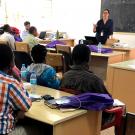A panel focused on university engagement to meet horticulture needs brought together academics and university leaders for a powerful discussion at the Horticulture Research for Development Conference, "Colorful Harvest: From Feeding to Nourishing a Growing World," held March 26-27, 2019 in Washington, D.C.
The panel was moderated by Rose Koenig, Interim Director of the University of Florida Institute of Food and Agricultural Sciences Global Offices. Panel speakers included:
- Betty Bugusu, Technical Director of LASER PULSE (Long-term Assistance and Services for Research, Partners for University-Led Solutions Engine) at Purdue University
- Julio López Montes, Professor and Director of the Horticulture Innovation Lab Regional Center at Zamorano University
- Ramadhani Majubwa, Professor at Sokoine University of Agriculture
Rose Koenig: Strengthening institutional capacity to catalyze change
As moderator of the panel, Koenig provided an overview of the session's topics, introductions to the speakers, and then structured the discussion with questions for each speaker.
As an overview for the session, Koenig noted that universities can play an important role in developing, evaluating and disseminating new innovations in horticulture. Examples of important innovations include seed improvement, evaluation and standardization of nutrient management practices, development of improved genetics, determination of the nutrient composition of foods and development of food preservation and food safety technologies. Globally, there are different roles that universities can play in agriculture research, education and extension. Historically, investments in research-based approaches to improve agriculture production have led to positive outcomes.
Panel objectives:
- Identify opportunities for universities to make positive contributions towards innovation within the horticultural sector
- Identify challenges that need to be addressed to improve the horticultural sector
- Identify innovative solutions that should be further tested or scaled up to improve the horticultural sector
Betty Bugusu and Long-Term Assistance and Services for Outreach (LASER)
LASER is part of the portfolio of USAID's Higher Educations Solutions Network 2.0 from the Center for Development Research at the U.S. Global Development Lab. LASER is a 5-year agreement with USAID led by Purdue University, with consortium partners: Catholic Relief Services, Indiana University, Makerere University and University of Notre Dame.
The program's goal is to support the discovery and uptake of university-sourced, evidence-based solutions to development challenges. It builds institutional capacity in higher education institutions located in low- and middle-income countries to administer and support high quality, sustainable research programs. Through close collaboration with government, non-government organizations and donor agencies, LASER aims to increase the capacity of higher education institutions to carry out research and translate results to effectively address development challenges. It also aims to increase the capacity of government, non-government and other implementing agencies to interact with research organizations and apply research results to their work.
Julio López Montes and Zamorano
Lopez provided an introduction to Zamorano University, which is an agricultural school that serves a student body from 20 Latin American countries. Located in Honduras, its mission is to develop leadership and entrepreneurial skills in students — centered around four career tracks and orientations.
The Horticulture Innovation Lab Regional Center at Zamorano promotes sustainable, low-cost methods of agricultural production among small- and medium-scale producers. The center tests and generates production and postharvest technologies that can help farmers adapt to environmental changes. The center also facilitates and promotes the adoption of new horticultural technologies to advance food security and food safety.
Ramadhani Majubwa and Sokoine University of Agriculture
Majubwa discussed Sokoine University of Agriculture (SUA), which is the largest public university in Tanzania. It has more than 9,375 students — including 8,920 undergraduates and 445 graduate students. Its programs are catered to agriculture and its related fields.
The Horticulture Innovation Lab project focused on building postharvest capacity in Tanzania is focused on improving teaching infrastructure, training in postharvest management, technology sharing and curriculum development related to postharvest practices.
As part of the project, the team is working to develop curriculum for a Master's of Science in Horticulture degree at SUA. In Tanzania, the horticulture industryhas been growing by 10-12 percent each year and is notable for its shift from traditional production to high-tech commercial production for high-value domestic and export markets. But the country lacks local professionals with competence needed for the horticulture industry; knowledge and skill development at the master's degree level is key to filling this skilled labor shortage.

